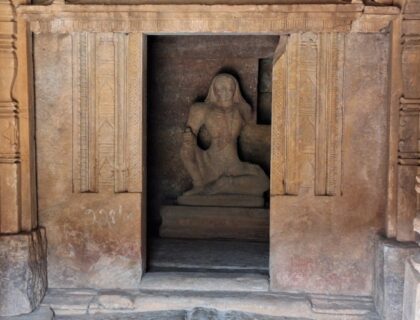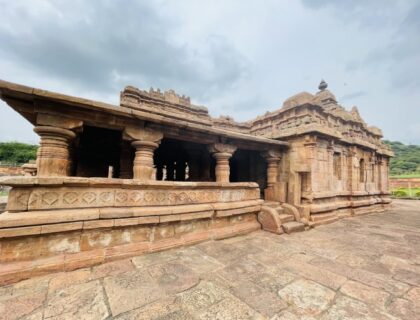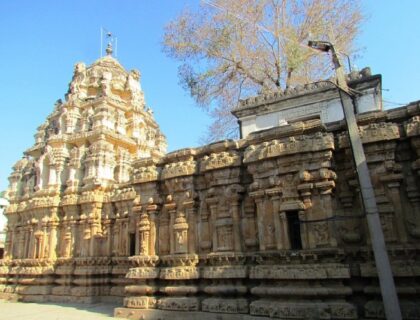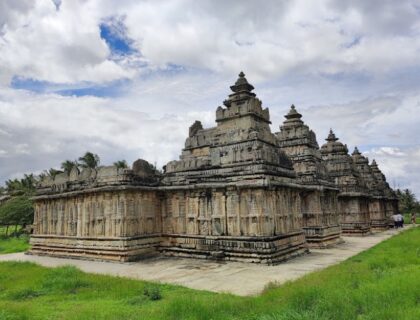Bhutanatha Temples Badami
Bhutanatha Temples Badami consists of a collection of sandstone temples dedicated to Lord Shiva. It is located in Badami, near the well-known Badami Cave Temples. The Bhutanatha temples are 7th to 12th-century Hindu temples located east of Agastya Lake in Badami, Karnataka, India. It is divided into two subgroups: the East Bhutanatha group, or Bhutanatha main group, from the 7th to 8th centuries, mostly in the Dravida architecture style; and the North Bhutanatha group, or Mallikarjuna group, from the 11th to 12th centuries, mostly in Nagara architecture. The former represents Badami Chalukya architects, while the latter and the nearby Yellamma temple represent Kalyani Chalukya architects.
Boothanatha Temple, dedicated to Lord Shiva, is Badami’s most striking structure and a key promotional element for Badami tourism. The temple is surrounded by water on three sides. The temple was built in the early eighth century by the Chalukyas. The temple, built in Dravidian style, is submerged in Agastya Lake and becomes inaccessible during peak monsoons when the lake’s water level reaches its maximum capacity. The temple features a pillared mukha mandapa, sabha mandapa, and an inner sanctum with a Shiva image. The main temple is flanked by several small shrines on its northern and eastern ends.
The Bhutanatha Temples Badami Overview
One of the most popular attractions in Badami, a historical town in Karnataka’s Bagalkot district, is the Bhutanatha temple complex. This small town, then known as Vatapi, served as the capital of the Early Chalukyan Dynasty.

History of Bhutanatha Temples Badami
The caves overlook Agastya Theertha Lake, which is dotted with Bhutanatha Temples. Bhutanatha Temples Badami, dedicated to Shiva’s form as the god of souls, spirits, and ghosts, was built in the seventh century, with the outer mantapa added in the eleventh century during the late Kalyani Chalukyan period.

The architecture of Bhutanatha Temples Badami
The famous Bhutanatha Temples Badami is located on the east side of the Agasthya Tirtha and was built in the style of the early Eastern Chalukyas. The design combines North Indian and early South Indian temple architecture. This temple appears to have been built in two stages.

The inner hall and shrine reflect the style of the Eastern Badami Chalukyas, whereas the outer hall represents the style of the Western Kalyani Chalukyas. The inner hall features massive pillars and bays decorated with lotus designs. Goddess Ganga, riding the Makara, stands on one side of the shrine’s doorway, with the river Yamuna on the other. She is depicted riding a tortoise.

The Bhutanatha main group (700-725 CE) is the oldest collection of Hindu shrines to the east of the Agastya Teertha. The main large temple is the oldest of the group. It features a gudha-mandapa with four massive central pillars (partly octagonal, cubical, and rounded on a lathe).

This mandapa connects to a smaller square-plan sanctum containing a Shiva linga. The Dravida-style tritala superstructure (three storeys) rises from the sanctum’s roof. The lower part is made up of a padabandha and kumbha. The vimana walls feature karnas with Brahmakanta-style pilasters. The wall’s nasis features the heads of kinnaras and Gandharvas.
Facts about Bhutanatha Temples Badami
- Bhutanatha Temples Badami, located 1.5 kilometres from Badami Bus Station and past the Badami Museum, is a magnificent structure on the banks of Agasthya Lake.
- The Bhutanatha Temples Badami is surrounded by water on three sides. The temple was built in the early eighth century by the Chalukyas.
- The Bhutanatha Temples Badami features a pillared mukha mandapa, sabha mandapa, and an inner sanctum with a Shiva image. The main temple is flanked by several small shrines on its northern and eastern ends.
- Bhoothnath’s form is said to be a combination of the God of Soul, Spirit, and Ghost. The temple is completely dark inside, with an image of Shiva in an angry form.
- The Bhoothnath monuments represent the earliest styles and phases of South Indian temple architecture.
- When you walk south from Boothanatha Temple, you’ll notice a few more striking monuments carved into the hill.
- The first is a bas-relief of Lord Narasimha, Varaha, Durga, Ganesha, Trimurthies, and other gods carved from the hill.
- Further south, towards the lake, there is a small stone structure with a beautifully carved image of Lord Vishnu sleeping. The main carving is done on a massive rock.
- The temple, built of sandstone, has an open mandapa (hall) that reflects the South Indian Dravidian and North Indian Nagara architectural styles.
- The inner shrine is thought to have been constructed by the Chalukyas in the seventh century. At the back of the temple, Lord Vishnu avatars and Jain figures are carved.
- No puja is performed in this temple as some part of the temple was destroyed by invaders.
Best Time to Visit Bhutanatha Temples Badami
This place is heavenly and spiritual; you can visit it all year. However, the best time to visit this temple is during the monsoon and winter seasons. During the monsoon season, this location receives moderate to heavy rainfall, making it appear heavenly with its greenery and bringing freshness elsewhere.
How To reach Bhutanatha Temples Badami
The Bhutanatha Temples Badami are located on the banks of Agasthya Lake in Badami, Karnataka.
By Air: The nearest airport is Hubli. It is located approximately 105 kilometres from Bhutanatha Temples Badami. Hubli Airport has regular flights to Mumbai and Bangalore. To get to Badami, take either a taxi or a bus.
By Rail: The nearest railway junction to Bhutanatha Temples Badami is Hubli Junction, which is connected to all domestic railheads. To get to Badami, take a taxi or use public transportation.
By Road: The well-built roads connect Bhutanatha Temples Badami to its neighbouring cities and many others. The state and private buses provide a satisfactory service to visitors.
Also Read – Varaha Lakshmi Narasimha Temple Simhachalam
Location
Facilities
- Drinking Water
- Pooja Item Shops
- Prasad Shops
- Restaurants Nearby
- Resting Room










































